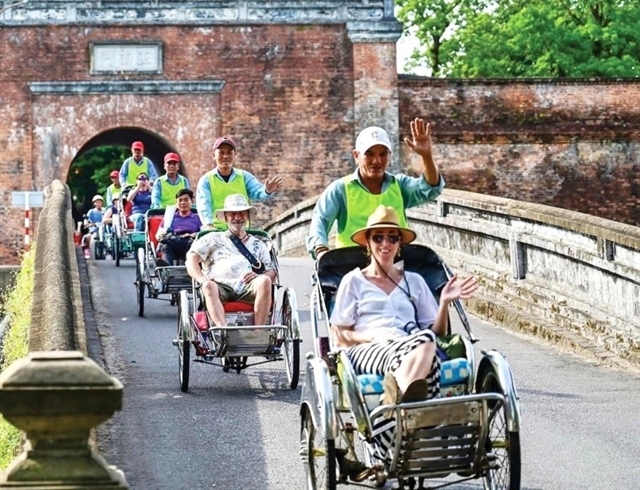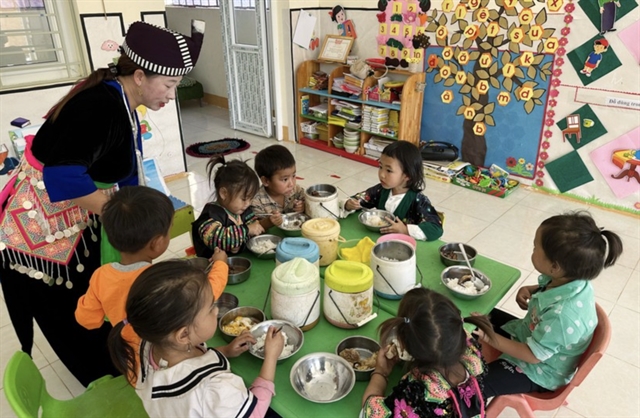 Society
Society

The reason many children have no birth certificate or residential registration was because their parents were married off as children.

|
| Lunch time at the Tri Lễ Kindergarten in Quế Phong District, Nghệ An Province. Photo giaoducthoidai.vn |
NGHỆ AN – Many preschools in border areas populated by ethnic minorities in the central Nghệ An Province are receiving applications from the parents of children who are not on the registration lists for the next school year.
Notably, most of the children are over kindergarten age.
At the beginning of the 2023 - 2024 school year the Tri Lễ Commune Kindergarten in Quế Phong District unexpectedly received applications for more than 30 children aged two to five not on the list.
Its principal Hoàng Thị Đài, recently transferred, was surprised and confused.
She said when she saw the first parents coming to seek admission their children, she found it strange because normally children born in the area are listed by commune officials for schools to predict the number of students during the school year.
And usually, before the beginning of each year, local officials and teachers go to each village and commune to persuade parents to send their children to school at the right age, she said.
But the children who unexpectedly came to school were not on any list, and their parents admitted the children did not have birth certificates or housing records, and so were not on the school’s enrolment list.
After some research Đài found out that the issue was not new or unusual in the province.
Vi Văn Du, Party secretary of Tri Lễ Commune, said children without birth certificates mainly live in the Mông ethnic villages of Huồi Mới, Pà Khốm, Mường Lống, Huồi Xái, and Nậm Tột.
The reason they have no birth certificate or residential registration was because their parents were married off as children, giaoducthoidai.vn quoted him as saying.
“In mountainous areas, especially Mông ethnic villages, the practice of child marriage is still considered normal.
“Through inspection it was found that more than 30 children without birth certificates and not sent to school at the right age are all children of couples who were married early.
“After getting married the couples went to other localities for working, and, when their children were three or four years old, sent them back to their home villages to their grandparents or relatives for raising.
“So the children have neither birth nor residential registrations either at home or their parents’ living place.”
Tri Lễ Commune officials exhorted the schools to safeguard the children's rights to attend school and receive education, and showed the children’s families how to complete the birth registration procedures, he said.
In the case of families where the parents married underage or had not registered their marriage, the children got their mothers’ surnames and residential registration.
Ensure children rights
Lý Bá H, five, is a student at Huồi Mối Kindergarten in Quế Phong District.
He is two years older than his classmates.
His parents wedded before they were old enough to register their marriage, and so he was not registered for a birth certificate.
H just got the certificate when he was five and then was registered in preschool with children aged two or three.
Lầu Y Pay, who has been a teacher for more than 10 years in Huồi Mới Village, has seen many children without birth certificates who had to join school much later than prescribed by the Government.
Every year she has to regularly review and guide parents in Huồi Mới Village to register their children's births to send them to school at the right age.
She said: “Most parents are aware of the importance of registering their child’s birth. But in the case of parents in underage marriages, problems arise when making the paperwork.
“According to regulations, if parents have not registered their marriage, when registering their child's birth, the child gets the mother's last name and household registration.
“But children's paternal families do not accept it, and want the birth certificate to have the full names of the parents and the child to have the father's surname.
“The awareness of family lineage among the Mông people is very high, and so [even] couples who get married as children are determined to wait until they are eligible to register their marriage and then register their children's birth so that the children can have their father's surname.”
According to Phạm Thị Thanh Trâm, the principal of Nậm Cắn Kindergarten in Kỳ Sơn District, children without birth certificates are disadvantaged in terms of benefits such as boarding school and State subsidies provided for ethnic minority students in border and remote mountainous areas.
To avail them, students must be listed by their schools based on their residential registration, she added. VNS




